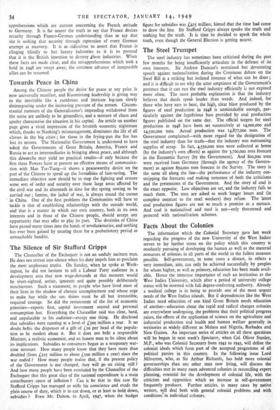Facts About the Colonies
The information which the Colonial Secretary gave last week regarding the progress of the new University of the West Indies serves to lay further stress on the policy which this country is resolutely pursuing of developing the human as well as the material resources of colonies in all parts of the world in the fullest measure possible. Self-government, in some cases a distant, in others a very immediate, aim, can only be achieved successfully by peoples for whom higher, as well as primary, education has been made avail- able. Hence the immense importance of such an institution as the West Indies University, which after a period of university college status will be invested with full degree-conferring authority. Already a medical college is in being to provide one' of the most urgent needs of the West Indian islands. But if dependencies like the West Indies need education of one kind Great Britain needs education of another—education about the rapid and radical changes colonies are everywhere undergoing, the problems that their political progress raises, the effects of the application of science on the agriculture and industrial production and health and human welfare generally in territories as widely different as Malaya and Nigeria, Barbados and New Guinea. An important series of articles on all these questions will be begun in next week's Spectator, when Col. Oliver Stanley, M.P., who was Colonial Secretary from 1942 to 1945, will define the colonial ideals which form part of the accepted programme of all political parties in this country. In the following issue Lord Milverton, who, as Sir Arthur Richards, has held more colonial governorships than any other man now living, will discuss the difficulties met in many more advanced colonies in reconciling expert planning, essential for the development of colonial life, with the criticism and opposition which an increase in self-government frequently produces. Further articles, in many cases by native writers, will deal both with general colonial problems ,and with conditions in individual colonies.-


































 Previous page
Previous page